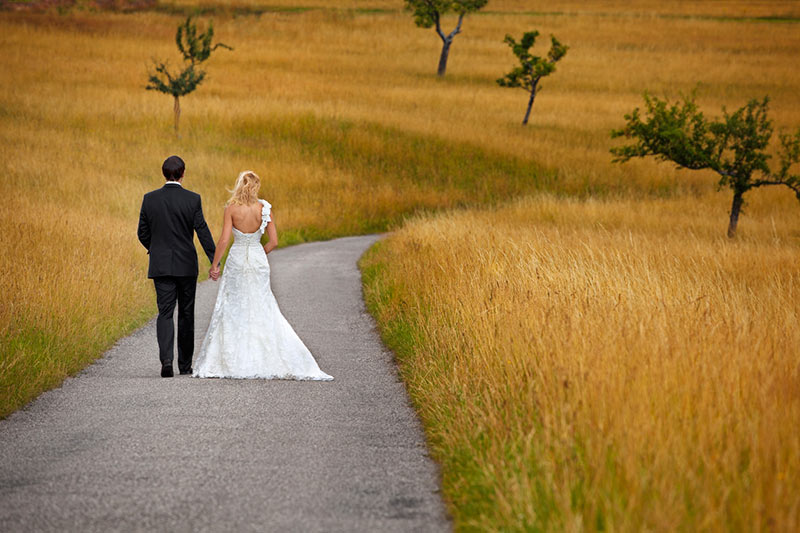
Perform a Wedding as a ULC Minister
The most commonly-performed ministerial service provided by Universal Life Church ministers is the solemnization of weddings. Any ULC minister can perform a wedding in 48 U.S. states (all but Pennsylvania and Virginia), regardless of their country of origin. Even better, many states don't require any form of ministerial documentation, used to serve as proof of ULC ministers' ordained status, when they attempt to file for a marriage license before or after they perform a wedding.
For example, the ULC Monastery's home state of Washington only requires that a wedding officiant verbally confirm their ordained status; Washington county clerks don't need to see an ordination credential, letter of good standing, or any other form of document in order to let a Universal Life Church minister file for a marriage license in that state.
How Marriages Are Solemnized
A marriage is only official in the United States if they are declared husband and wife (and other variations thereof) by a wedding officiant and sign a marriage certificate. The former happens during the wedding, be it a civil or religious ceremony, while the latter can occur within a couple days before or after the ceremony, depending upon the state marriage laws of the state where the ceremony was performed.
As previously mentioned, any given ULC minister has the right to perform a wedding. Conventionally-ordained ministers, judges, ship captains, and, in some states, Salvation Army officers are also legally-recognized wedding officiants.
Where You Are Likely to Perform a Wedding
 Despite the rapid decoupling of religion from weddings that has occurred within the last couple of decades, an estimated 80% of the 6,200 weddings that occur every day in the United States (on average) are performed in churches. So, while conventionally-ordained ministers are more likely than you to perform a wedding in a Baptist, Lutheran, or Catholic church, it is still entirely possible that a tradition-oriented friend, family member, or client will ask you to officiate one there.
Despite the rapid decoupling of religion from weddings that has occurred within the last couple of decades, an estimated 80% of the 6,200 weddings that occur every day in the United States (on average) are performed in churches. So, while conventionally-ordained ministers are more likely than you to perform a wedding in a Baptist, Lutheran, or Catholic church, it is still entirely possible that a tradition-oriented friend, family member, or client will ask you to officiate one there.
The best part of being a Universal Life Church minister is that you get to officiate wedding ceremonies in highly irregular and non-traditional ways. Have you ever seen a Methodist, Anglican, or Pentecostal minister perform a wedding in a speakeasy, on top of a mountain, or underwater amidst a coral reef? Probably not, but these are all locations that ULC ministers have officiated ceremonies at. Are our ministers inherently more adventurous and fun-loving than conventional ones, or do more adventurous and fun-loving people prefer wedding officiants who received their ordination online? The ULC Monastery does not know and thus will not comment on the matter, so feel free to draw your own conclusions.
The Wedding Ceremony
Know that the only requirement every time you perform a wedding is to make a declaration of intent (i.e. "Will you have this woman to be your wife") in order to make the marriage legal. Other than this declaration, the rest of the ceremony is up to the bride and groom's wishes. They can choose to have the ceremony wherever they wish with whatever bizarre themes and components they can imagine.
In most wedding ceremonies, even those held outside a church, the groom's family and friends are placed on one side of the aisle while the bride's family and friends are placed on the other side. The usher then seats the families of the bride and groom. After everyone is seated, the minister and the groom enter onto the stage. Once they are in their respective positions, the bridesmaids and groomsmen will walk down the aisle, followed by the maid of honor and the best man as well as the flower girl and the ring bearer. The bride's father will then accompany the bride as they walk down the aisle.
The minister typically begins the ceremony with a prayer. Following the prayer, the father gives away the bride to the groom. The minister charges the couple with the duties of marriage. The couple then gives their pledge, which is the understanding and promise of their duties to one another. The groom and bride then give one another personal vows. Once their vows are completed, the groom and bride exchange their wedding rings. At this point, the minister pronounces them married, and they kiss for the first time as husband and wife. The minister then presents the newlyweds as a married couple for the first time to their family and friends.
Add Your Comment